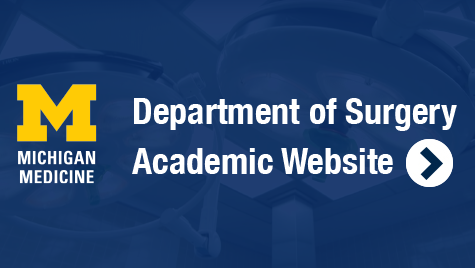The innovative transplant surgery research at U-M is changing how patients with organ injury and failure are treated globally. Decades of groundbreaking work by our faculty developing mechanical devices to treat acute organ failure outside the body, known as extracorporeal life support (ECLS), continue to save tens of thousands of lives. Today, extracorporeal membrane oxygenation (ECMO) technologies developed here are being applied to ever-expanding patient populations, disease states and organ types. For example, ambulatory ECMO enables patients with respiratory failure to remain active and in their own homes while awaiting lung transplant. The technology also is being used to resuscitate and maintain organs outside the body for unprecedented periods of time and to mend organs, such as lungs, that have been damaged. These capabilities are critical to addressing the shortage of donor organs and enable us, and other centers, to provide transplants to a greater number of patients.
Many discoveries by our faculty have deepened the understanding of the body's immune response after transplantation and how transplanted organs can be injured in — and acquire resistance to — these processes. With our transplant surgery research, we aim to improve health, develop novel interventions and enhance the delivery of health services and surgical outcomes. Our results are shaping the care of transplant patients everywhere — today and undoubtedly for years to come.
Identifying the Factors in Successful Organ Transplants
Our faculty have been making sustained contributions to the understanding of the mechanisms of immunity and transplant rejection and devising new ways to protect transplanted organs from subsequent injury.
Preserving Organs
Building upon extracorporeal life support (ECLS) technology, developed at U-M nearly 50 years ago, faculty are developing new ways to resuscitate and heal donor organs to expand today's inadequate supply. Faculty also work to develop bio-artificial organs as a bridge to transplant or as destination therapy for patients with organ injury and failure.
Reducing Opioid Use
Working at one of the largest transplant centers in the United States, our faculty have a unique perspective. Their firsthand observation of the sharp rise in organ donation as a result of opioid overdoses in recent years has brought them to the forefront of efforts to reduce opioid use among surgical patients. Our faculty's founding and leadership of the Michigan Opioid Prescribing Engagement Network is having a direct impact. Faculty also have developed and disseminated opioid prescribing recommendations for 25 surgical procedures. Opioid prescribing following surgery has fallen by greater than 50% from 2017 to 2019. This program is a broad research, care improvement, and community engagement program representing a partnership between academics, state and federal government, Blue Cross and Blue Shield of Michigan, caregivers, and communities.
Improving Patient Fitness for Surgery
Through a novel program developed by U-M faculty, we are helping patients prepare themselves for surgery, much like an athlete would train for competition. The Michigan Surgical & Health Optimization Program, or MSHOP, helps patients make improvements in physical activity, smoking cessation, diet and stress reduction. Through MSHOP, patients can improve some of the factors that put them at higher risk of complications after transplant and other surgical procedures. Research has shown that patients who participate spend less time in the hospital following surgery and have lower costs of care. Based on this work, now most patients at Michigan Medicine do a prehabilitation program prior to surgery, and prehabilitation is expanding across the state.


